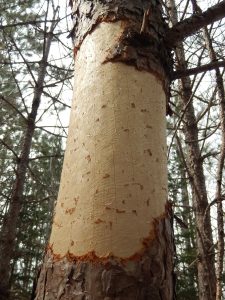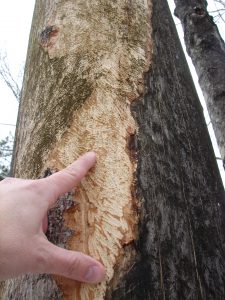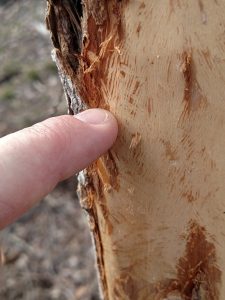
Porcupine damage to red pine.
Porcupines and squirrels damage trees by eating the bark. Sometimes they remove large areas of bark on branches as well as on the main stem. On sunny days the pale wood where the bark has been stripped off really stands out in the woods.
This type of feeding can remove enough bark to girdle the branches or the main stem, causing the tree to die from that point to the end of the branch. Branches that are not completely girdled will continue to grow and callus tissue will begin to grow over the wounds. If branches are nearly girdled, they may leaf out in the spring only to have the leaves suddenly wilt and die as hot weather hits because the tree can’t move enough water to keep the leaves alive.

Porcupine damage can be identified by the large scrape marks from their teeth which are 3.6 to 4.8mm wide.

Squirrel damage can be identified by the smaller scrape marks from their teeth, which are 1.3 to 1.7mm wide.
Squirrels prefer hardwoods. I tend to see a lot of damage on maples, though I’ve also seen squirrel damage on galls or callus tissue of almost any hardwood species. Porcupines will de-bark both hardwoods and conifers. If both porcupines and squirrels can feed on bark in the crowns of trees, how do you know which one is doing the damage? The size of the tooth marks left in the wood is the key. For a gray squirrel the incisor widths vary from 1.3-1.7 mm, for a porcupine it’s nearly 3 times that, or about 3.6-4.8 mm.
Rabbits, mice and voles can cause damage similar to that of squirrels and porcupines, but the damage will be located near the base of the tree instead of in the crown.
Written by: Linda Williams, forest health specialist, Green Bay, (Linda.Williams@wisconsin.gov), 920-662-5172.
